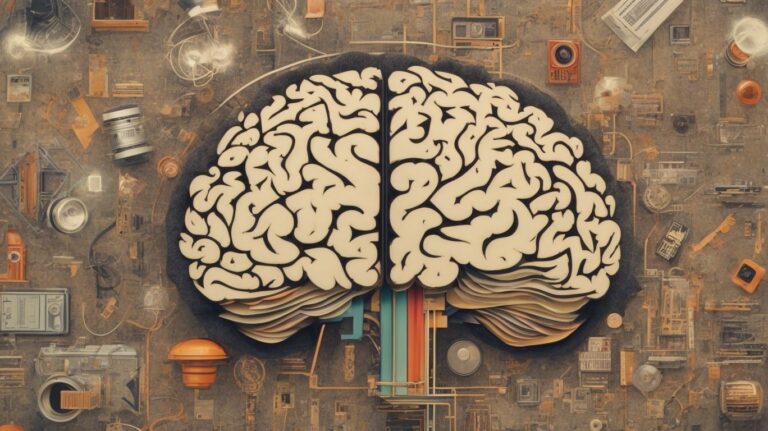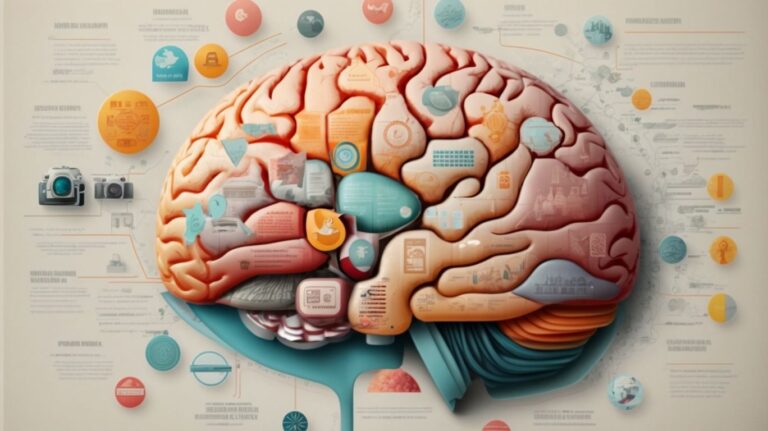Are you curious about how individuals grow and change over time? Developmental theory in psychology seeks to answer this question, examining key concepts such as nature vs. nurture, continuity vs. discontinuity, critical periods vs. sensitive periods, and stability vs. change.
In this article, we will delve into the different perspectives within developmental theory, including the psychodynamic, behavioral, cognitive, humanistic, sociocultural, and evolutionary perspectives. By understanding how these perspectives explain development as a series of stages, a continual process, a product of interactions, and a result of biological and environmental factors, we can gain a deeper insight into the complex processes of human development.
Join us on this journey as we explore the fascinating world of developmental theory in psychology.
- Developmental theory in psychology studies how humans change and grow over time, explaining the various factors that influence our development.
- Key concepts of developmental theory include the debate between nature and nurture, the idea of continuity vs. discontinuity, critical vs. sensitive periods, and stability vs. change.
- There are multiple perspectives in developmental theory, including psychodynamic, behavioral, cognitive, humanistic, sociocultural, and evolutionary, each offering a unique explanation of development.
Contents
- 1 What Is Developmental Theory in Psychology?
- 2 What Are the Key Concepts of Developmental Theory?
- 3 What Are the Different Perspectives in Developmental Theory?
- 4 How Do These Perspectives Explain Development?
- 5 Frequently Asked Questions
- 5.1 1) What is developmental theory in psychology?
- 5.2 2) Why is it important to explore developmental theory in psychology?
- 5.3 3) What are some key concepts in developmental theory?
- 5.4 4) What are the different perspectives in developmental theory?
- 5.5 5) How does developmental theory impact our understanding of human behavior?
- 5.6 6) How can developmental theory be applied in practical settings?
What Is Developmental Theory in Psychology?
Developmental theory in psychology refers to a set of perspectives and principles that explain how individuals grow, change, and adapt throughout their lives, with notable contributions from psychologists such as Freud, Erikson, and other key theorists.
Developmental theory provides a framework to study various aspects of human development, including physical, cognitive, and socioemotional growth. By looking into these theories, one can gain profound insights into the factors that influence an individual’s behavior and personality. This knowledge is crucial for educators, parents, and mental health professionals to create supportive environments that foster healthy development in children and adolescents. The works of psychologists like Piaget, Vygotsky, Bowlby, and Bandura have had a significant impact on shaping developmental theories, offering different perspectives on how individuals transform through different stages of life.
What Are the Key Concepts of Developmental Theory?
The key concepts of developmental theory encompass various stages of growth, cognitive processes, behavioral patterns, social interactions, and environmental influences that shape an individual’s development over time.
Understanding these fundamental elements is crucial to comprehending how individuals evolve and adapt through life. Developmental theory explains how people progress through stages like infancy, childhood, adolescence, and adulthood, each with unique challenges and milestones. Cognitive aspects, such as reasoning, problem-solving, and memory, play a significant role in shaping one’s perceptions of the world. Behavioral patterns, including habits, emotions, and responses, are developed through experiences and learning.
Social interactions with family, peers, and society at large contribute to an individual’s identity formation and interpersonal skills. The environment in which a person grows up, including family dynamics, socioeconomic status, and cultural influences, profoundly impacts their development trajectory.
Nature vs. Nurture
The nature vs. nurture debate in child development theory explores the interplay between genetic predispositions (nature) and environmental influences (nurture) in shaping an individual’s growth and behavior.
This ongoing discourse delves into whether genetics or the environment plays a more significant role in determining the developmental trajectory of a child. Scholars and researchers have long sought to understand how nature and nurture interact and influence various aspects of a child’s physical, cognitive, and socio-emotional development.
Genetic factors provide the blueprint for an individual’s traits, but the surrounding environment, including family dynamics, schooling, and societal influences, significantly shape how these genetic predispositions manifest in a child’s behavior and personality.
Continuity vs. Discontinuity
The continuity vs. discontinuity perspective in developmental theory deliberates whether development is a gradual, continuous process or if it occurs in distinct stages and abrupt shifts.
Proponents of continuous development argue that growth occurs steadily, with changes happening gradually over time, akin to a flowing river, where each small step seamlessly builds upon the previous one.
On the other hand, advocates of discontinuous development propose that individuals progress through life in distinct stages, marked by sudden transformations, resembling a series of steps that lead to a significant leap forward in development.
Critical Periods vs. Sensitive Periods
Critical periods and sensitive periods in developmental theory denote specific time frames during which individuals are most receptive to certain experiences or stimuli, influencing their long-term development.
During these critical periods and sensitive periods, the brain exhibits heightened plasticity and responsiveness, making it especially open to learning and adapting. For instance, the language acquisition window in early childhood is a critical period where children absorb language skills rapidly. Similarly, sensitive periods in social development may occur during adolescence, shaping social skills and emotional regulation. It’s crucial for caregivers and educators to provide enriching, stimulating environments during these periods to optimize children’s cognitive, emotional, and social development.
Stability vs. Change
The stability vs. change dichotomy in developmental theory examines whether individuals’ traits and characteristics remain consistent over time (stability) or undergo significant transformations (change) throughout their development.
Stability implies that certain attributes persist from infancy through adulthood, offering a sense of predictability and continuity in an individual’s behavior and characteristics. On the other hand, change suggests that traits can be influenced by various factors such as environmental stimuli, experiences, and personal growth, leading to modifications in one’s personality and skills over time.
Developmental outcomes are influenced by the interplay between stability and change, with some traits remaining relatively constant while others evolving based on internal and external influences.
What Are the Different Perspectives in Developmental Theory?
Developmental theory encompasses various perspectives including Piaget’s cognitive theory, Bowlby’s attachment theory, Bandura’s social learning theory, and Vygotsky’s sociocultural theory, shedding light on different aspects of human growth.
Each of these theories offers a unique lens through which to understand how individuals grow and develop over time. Piaget’s cognitive theory emphasizes the importance of schemas and stages in shaping cognitive development, while Bowlby’s attachment theory focuses on the significance of early relationships in forming emotional bonds.
Bandura’s social learning theory highlights the role of observation and imitation in acquiring new behaviors, whereas Vygotsky’s sociocultural theory underscores the influence of cultural context and social interactions on cognitive processes.
Psychodynamic Perspective
The psychodynamic perspective, influenced by Sigmund Freud’s Psychosexual Developmental Theory, emphasizes the role of unconscious drives, early experiences, and stages of development in shaping individuals’ personalities.
Freud proposed that personality development occurs through a series of Psychosexual Stages, starting from infancy to adolescence.
Each stage is associated with a specific erogenous zone and the gratification of certain needs, playing a crucial role in the formation of an individual’s psychosexual development.
According to Freud, unresolved conflicts during these stages could lead to fixation, affecting behaviors and personality traits later in life.
This emphasis on the influence of early childhood experiences and the unconscious mind distinguishes the psychodynamic perspective from other developmental theories.
Behavioral Perspective
The behavioral perspective in developmental theory, rooted in behaviorism and conditioning principles, emphasizes how external stimuli, rewards, and punishments influence individuals’ behaviors and development.
Behaviorism, as a key component of the behavioral perspective, highlights the importance of observable behaviors and the impact of the environment on shaping these behaviors. Classical conditioning introduced by Ivan Pavlov and operant conditioning by B.F. Skinner are major theories that explain how learning occurs through associations and consequences.
External factors such as family dynamics, cultural influences, and social interactions play a significant role in shaping an individual’s behavior from childhood through adulthood. The principles of reinforcement and punishment in behavioral theories help in understanding how behaviors are learned and reinforced over time.
Cognitive Perspective
The cognitive perspective in developmental theory, as elucidated by Jean Piaget, highlights how individuals acquire knowledge, solve problems, and develop thinking patterns through cognitive processes and stages of development.
At the core of Piaget’s stages of cognitive development are the four distinct periods that individuals progress through to construct their understanding of the world: the sensorimotor, preoperational, concrete operational, and formal operational stages. Each stage presents unique cognitive challenges and milestones that shape the individual’s ability to reason, problem-solve, and think critically. Piaget emphasized that these stages are universal, albeit varying in timing and progression among individuals.
Humanistic Perspective
The humanistic perspective in developmental theory, influenced by Maslow’s hierarchy of needs and the concept of self-actualization, emphasizes individuals’ innate drive for personal growth, fulfillment, and realizing their full potential.
In humanistic theories, self-actualization represents the zenith of human potential, where individuals strive to become the best version of themselves, transcending basic needs towards higher aspirations. This approach underscores the importance of subjective experiences, emotions, and a holistic view of human existence. Maslow’s contribution in outlining a hierarchy of needs paved the way for understanding human motivation, emphasizing that individuals seek to satisfy not only basic physiological needs but also psychological and self-fulfillment needs.
Sociocultural Perspective
The sociocultural perspective in developmental theory, shaped by Vygotsky’s theories, underscores the significance of cultural context, social interactions, and language in promoting cognitive development and learning.
Vygotsky’s zone of proximal development (ZPD) is a key concept within this framework, highlighting the difference between a learner’s independent problem-solving ability and what they can achieve with guidance or collaboration from a more knowledgeable other.
This theory emphasizes the role of cultural influences in shaping an individual’s understanding of the world, arguing that learning is deeply embedded in social and cultural contexts.
Through social interactions, individuals acquire new knowledge and skills by participating in activities that are meaningful within their cultural environment, fostering cognitive growth and development.
Evolutionary Perspective
The evolutionary perspective in developmental theory, influenced by Charles Darwin’s evolutionary principles, explores how behaviors and traits that aid survival and reproduction are passed down through generations, shaping human development.
This perspective delves into the concept of natural selection, proposing that organisms best adapted to their environment are more likely to survive and pass on their genes, thus influencing the characteristics of future generations. Adaptation plays a key role in this process, where individuals with advantageous traits have a higher chance of reproductive success, contributing to the perpetuation of those traits over time.
Darwin’s theories emphasized the inheritance of beneficial traits, highlighting how favorable characteristics can become more prevalent within a population through generations, ultimately shaping the genetic makeup of a species. The interplay between genetic inheritance and environmental pressures forms the foundation of evolutionary developmental theory, offering insights into the intricate mechanisms influencing human evolution.
How Do These Perspectives Explain Development?
These perspectives elucidate development as a multifaceted process influenced by stages of growth, interpersonal interactions, biological maturation, and environmental factors that collectively shape individuals’ growth trajectories.
Each perspective offers a unique lens through which to understand how individuals progress through different stages of development. For instance, the psychodynamic perspective focuses on the role of unconscious drives and early childhood experiences in shaping behavior.
On the other hand, the cognitive perspective emphasizes how individuals process information, solve problems, and make decisions, highlighting the role of cognitive capacities in development.
The sociocultural perspective underscores the impact of cultural norms, societal expectations, and interpersonal relationships on an individual’s growth.
Development as a Series of Stages
Viewing development as a series of stages posits that individuals progress through distinct phases of growth, each characterized by unique challenges, milestones, and developmental tasks.
These stages, as postulated in developmental theories, offer a framework to understand how humans evolve physically, cognitively, and emotionally across the lifespan.
Jean Piaget’s cognitive development theory,
- sensorimotor
- preoperational
- concrete operational
- formal operational
elucidating how children acquire and refine cognitive abilities through sequential steps.
Moreover, Erik Erikson’s psychosocial theory delineates crucial psychosocial crises individuals face at different stages, emphasizing the importance of resolving conflicts for healthy psychological development.
Development as a Continual Process
Viewing development as a continual process suggests that growth unfolds gradually over time, with individuals constantly acquiring new skills, knowledge, and experiences to enhance their development.
From infancy to old age, the journey of development is marked by a series of transformative stages where cognitive, emotional, and physical growth intertwine to shape the individual.
Continuous development theories highlight the importance of environmental influences, genetic predispositions, and personal experiences in molding one’s evolving identity and capabilities. This holistic approach to growth underscores the significance of every learning opportunity, interpersonal interaction, and life event in propelling individuals towards self-actualization and fulfillment.
Developmental perspectives reinforce the idea that mastery of skills, adaptation to challenges, and introspection are all inherent components of the lifelong process of growth.
Development as a Product of Interactions
Development as a product of interactions underscores the role of social exchanges, relationships, and environmental engagements in shaping individuals’ cognitive, emotional, and behavioral development.
From a developmental perspective, it is evident that interactions play a crucial role in influencing how individuals perceive the world around them and how they navigate various challenges. The quality of relationships formed during critical periods of growth can significantly impact one’s long-term emotional well-being and overall development. The environmental contexts in which these interactions take place shape individuals’ responses, behaviors, and learning processes, illustrating the interconnected nature of human development.
Development as a Result of Biological and Environmental Factors
Development as a consequence of biological and environmental factors acknowledges the interplay between genetic predispositions, physiological changes, and external influences in shaping individuals’ developmental trajectories.
This complexity manifests in diverse ways, such as how genetics may set the foundation for certain biological processes, prompting physiological shifts that can be further influenced by environmental stimuli.
For example, a person’s genetic makeup can predispose them to certain health conditions, while environmental factors like diet and lifestyle choices can either exacerbate or mitigate these risks.
By considering the intricate dance between nature and nurture, researchers gain insights into the nuanced mechanisms underlying growth and change.
Frequently Asked Questions
1) What is developmental theory in psychology?
Developmental theory in psychology refers to a set of ideas and concepts that explain how humans grow, change, and develop throughout their lives. It looks at the physical, cognitive, emotional, and social changes that occur as a person moves from infancy to adulthood.
2) Why is it important to explore developmental theory in psychology?
Exploring developmental theory in psychology allows us to understand the complex processes of human development and how they impact behavior and functioning. It also helps us gain insight into how different factors, such as genetics, environment, and culture, contribute to development.
3) What are some key concepts in developmental theory?
Some key concepts in developmental theory include nature versus nurture, sensitive periods, critical periods, and the influence of social and cultural factors on development. Another important concept is the idea that development is a continuous and dynamic process, rather than a series of distinct stages.
4) What are the different perspectives in developmental theory?
There are several perspectives in developmental theory, including the psychoanalytic perspective, the cognitive perspective, the behavioral perspective, and the social learning perspective. Each perspective offers a unique explanation for how and why development occurs.
5) How does developmental theory impact our understanding of human behavior?
Developmental theory provides a framework for understanding the influences and processes that shape human behavior. It helps us identify factors that may contribute to the development of certain behaviors and provides insight into how these behaviors may change over time.
6) How can developmental theory be applied in practical settings?
Developmental theory has practical applications in fields such as education, parenting, and counseling. By understanding the stages and processes of development, individuals can use this knowledge to support healthy development and address potential challenges that may arise.




